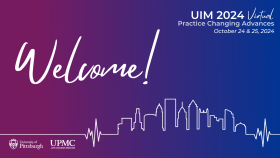
MASLD & MASH: How to Work Up and When to Refer
Jaideep Behari, MD, PhD presents the online training, “MASLD & MASH: How to Work Up and When to Refer” designed for healthcare professionals. Discover cutting-edge techniques and insights where you will learn new consensus nomenclature and risk stratification algorithms for MASLD. Enhance your skills in noninvasive liver fibrosis assessment using elastography for patients with steatotic liver disease.
Target Audience
Physician, Advanced Practice Provider, Nurse, Nurse Practitioner, Pharmacist, Physician Assistant, and Other Healthcare Professional.
Learning Objectives
Upon completion of this activity, participants should be able to:
- Implement new consensus nomenclature for MASLD in practice.
- Implement MASLD risk stratification algorithms in practice.
- Improve skills for noninvasive assessment of liver fibrosis using elastography for patients with steatotic liver disease.
Presenters:
Jaideep Behari, MD, PhD
Professor of Medicine
Division of Gastroenterology, Hepatology, & Nutrition
Director, UPMC Liver Steatosis and Metabolic Wellness Program
Director, Translational Research for Hepatology
Associate Director, Pittsburgh Liver Research Center
University of Pittsburgh School of Medicine
CONFLICT OF INTEREST DISCLOSURE
- Dr. Behari received grant/research support from Gilead Sciences, Pfizer, AstraZeneca, and Endra Life Sciences. Dr. Behari has disclosed institutional research contracts with the following: Intercept, Pfizer, Inventiva, Akero, Rhythm, Galectin, and Madrigal.
No other members of the planning committee, speakers, presenters, authors, content reviewers and/or anyone else in a position to control the content of this education activity have relevant financial relationships with any companies whose primary business is producing, marketing, selling, re-selling, or distributing healthcare products used by or on patients.
DISCLAIMER STATEMENT
The information presented at this CME program represents the views and opinions of the individual presenters, and does not constitute the opinion or endorsement of, or promotion by, the UPMC Center for Continuing Education in the Health Sciences, UPMC / University of Pittsburgh Medical Center or Affiliates and University of Pittsburgh School of Medicine. Reasonable efforts have been taken intending for educational subject matter to be presented in a balanced, unbiased fashion and in compliance with regulatory requirements. However, each program attendee must always use his/her own personal and professional judgment when considering further application of this information, particularly as it may relate to patient diagnostic or treatment decisions including, without limitation, FDA-approved uses and any off-label uses.
In support of improving patient care, the University of Pittsburgh is jointly accredited by the Accreditation Council for Continuing Medical Education (ACCME), the Accreditation Council for Pharmacy Education (ACPE), and the American Nurses Credentialing Center (ANCC), to provide continuing education for the healthcare team.
Physician (CME)
The University of Pittsburgh designates this live activity for a maximum of 1.0 AMA PRA Category 1 Credits™. Physicians should claim only the credit commensurate with the extent of their participation in the activity.
Successful completion of this CME activity enables the participant to earn MOC points in the American Board of Internal Medicine’s (ABIM) Maintenance of Certification (MOC) program. Participants will earn ABIM MOC points equivalent to the amount of CME credits claimed for the activity.
Nursing (CNE)
The maximum number of hours awarded for this Continuing Nursing Education activity is 1.0 contact hours.
Physician Assistant (AAPA)
The University of Pittsburgh has been authorized by the American Academy of PAs (AAPA) to award AAPA Category 1 CME credit for activities planned in accordance with AAPA CME Criteria. This activity is designated for 1.0 AAPA Category 1 CME credits. PAs should only claim credit commensurate with the extent of their participation.
Other health care professionals will receive a certificate of attendance confirming the number of contact hours commensurate with the extent of participation in this activity.
Available Credit
- 1.00 AAPA Category I CME
- 1.00 ABIM MOC II
- 1.00 AMA PRA Category 1 Credit™The University of Pittsburgh School of Medicine is accredited by the Accreditation Council for Continuing Medical Education to provide continuing medical education for physicians.
- 1.00 ANCCUPMC Provider Unit is accredited as a provider of continuing nursing education by the American Nurses Credentialing Center’s Commission on Accreditation
- 1.00 Attendance
Choose Register/Complete Course to complete the module.
First time Users: If you have never completed training on this website, please select register in the upper right hand corner of the webpage.
Returning Users: If you have completed training on this website, please log in in the upper right hand corner of the webpage.

 Facebook
Facebook X
X LinkedIn
LinkedIn Forward
Forward